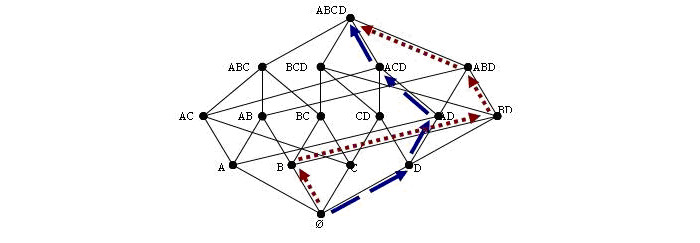Research & Development
Science and software
Knowledge spaces and their application
In my scientific research I am primarily concerned with knowledge space theory, an algebraically formulated model for structuring knowledge domains on the basis of presupposition relationships between items of knowledge. A particular focus is on the application of these knowledge spaces for adaptive knowledge diagnosis and on the development of computationally efficient algorithms.
Knowledge space theory, founded in 1985 by Jean-Paul Doignon and Jean-Claude Falmagne, provides a good framework for structuring areas of knowledge on the basis of prerequisite relationships. These knowledge structures can then be used, e.g., for adaptive knowledge diagnosis and personalised teaching.
In the context of knowledge space theory, I have mainly dealt with adaptive knowledge assessment. Here, the answers received (and their correctness) are already used during the diagnosis to infer the ability to solve other tasks. This can significantly reduce the number of questions to be asked.
However, these procedures can quickly become computationally very complex in real applications. That is why I have been particularly concerned with the development of more parsimonious procedures.
A bibliography on knowledge spaces can be found here.

R and R Shiny Apps
In software development, I have recently discovered for myself the statistical programming language R and its extension Shiny. My activities in this direction are twofold: on the one hand I maintain and program R packages for knowledge space theory, on the other hand I write R Shiny apps that illustrate the concepts of knowledge space theory interactively.
Another project in this context is ShinyBibTeX - an app for displaying statistical data about BibTeX literature databases.
R packages for knowledge space theory
Several add-on packages for R offer functions for working with knowledge structures, including some that I maintain or have written.
- kst: Basic functions for working with knowledge structures (uses set representation)
- kstMatrix: Partial re-implementation of kst functions (in more efficient matrix representation)
- kstIO: Functions for loading and saving knowledge space files
- CDSS: Course-based skill structures
Other R packages for KST from other authors are DAKS and pks.
An overview of the R packages for STS can be found here.
